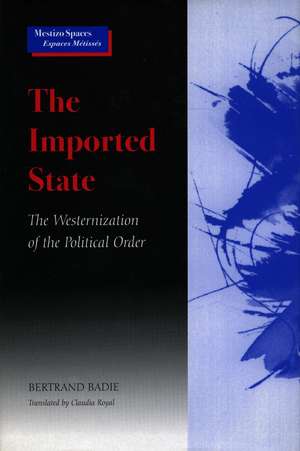The Imported State: The Westernization of the Political Order: Mestizo Spaces / Espaces Metisses
Autor Bertrand Badie Traducere de Claudia Royalen Limba Engleză Paperback – 31 mar 2000
This book traces the rise of the modern state—a mode of organizing political power within a closed territory—in post-Enlightenment Europe and its spread to the remainder of the world, especially colonial and postcolonial societies. The result of a long process of evolution dating back to the Roman Empire, this new form of state was characterized by the coincidence of public power and public space and the legalization of political and social relations. Intimately linked to the transformation of Western European cultures at a time when their economic might allowed them to conquer many regions of the world, the modern state provided a model that was adopted in most countries.
The book analyzes the different conditions in which the modern state was grafted onto different cultural realities: a metropolitan model adopted by settlers or imposed as an instrument of colonial domination, or a representation of modernity selected by non-Western leaders out of fascination for its alleged efficiency and rationality. The author shows that, from the beginning, various logics of importation led non-Western cultures to invent their own practices of the state, thereby transforming the original model. In many countries, notably in postcolonial societies, discrepancies appeared between political actions and political representations and principles on which the state was supposed to rest. This has often led to political crises and breakdowns of legality and legitimacy, and to the formation of new types of social relations in spaces the state cannot control. At the international level, a similar phenomenon can be seen: international networks, based on trade links, religion, and culture, are now able to bypass official interstate relations.
The book analyzes the different conditions in which the modern state was grafted onto different cultural realities: a metropolitan model adopted by settlers or imposed as an instrument of colonial domination, or a representation of modernity selected by non-Western leaders out of fascination for its alleged efficiency and rationality. The author shows that, from the beginning, various logics of importation led non-Western cultures to invent their own practices of the state, thereby transforming the original model. In many countries, notably in postcolonial societies, discrepancies appeared between political actions and political representations and principles on which the state was supposed to rest. This has often led to political crises and breakdowns of legality and legitimacy, and to the formation of new types of social relations in spaces the state cannot control. At the international level, a similar phenomenon can be seen: international networks, based on trade links, religion, and culture, are now able to bypass official interstate relations.
| Toate formatele și edițiile | Preț | Express |
|---|---|---|
| Paperback (1) | 261.52 lei 6-8 săpt. | |
| Stanford University Press – 31 mar 2000 | 261.52 lei 6-8 săpt. | |
| Hardback (1) | 776.46 lei 6-8 săpt. | |
| Stanford University Press – 31 mar 2000 | 776.46 lei 6-8 săpt. |
Preț: 261.52 lei
Nou
Puncte Express: 392
Preț estimativ în valută:
50.05€ • 52.06$ • 41.32£
50.05€ • 52.06$ • 41.32£
Carte tipărită la comandă
Livrare economică 12-26 aprilie
Preluare comenzi: 021 569.72.76
Specificații
ISBN-13: 9780804737678
ISBN-10: 0804737673
Pagini: 296
Ilustrații: notes, bibliography, index
Dimensiuni: 152 x 229 x 20 mm
Greutate: 0.38 kg
Ediția:1
Editura: Stanford University Press
Colecția Stanford University Press
Seria Mestizo Spaces / Espaces Metisses
ISBN-10: 0804737673
Pagini: 296
Ilustrații: notes, bibliography, index
Dimensiuni: 152 x 229 x 20 mm
Greutate: 0.38 kg
Ediția:1
Editura: Stanford University Press
Colecția Stanford University Press
Seria Mestizo Spaces / Espaces Metisses
Recenzii
"This is an important book by any standard. No matter how commonplace it is to observe that the state was born in Western Europe and subsequently exported to the rest of the world, until now there has been no single book that traces out the implications of this for those peripheral, extra-European societies that were compelled to import this bizarre form of political order. It is impossible to do justice to the variety and scope of arguments that Badie develops in this extraordinarily erudite and interdisciplinary work."
—Philippe C. Schmitter,Stanford University
—Philippe C. Schmitter,Stanford University
Textul de pe ultima copertă
“This is an important book by any standard. No matter how commonplace it is to observe that the state was born in Western Europe and subsequently exported to the rest of the world, until now there has been no single book that traces out the implications of this for those peripheral, extra-European societies that were compelled to import this bizarre form of political order. It is impossible to do justice to the variety and scope of arguments that Badie develops in this extraordinarily erudite and interdisciplinary work.”
—Philippe C. Schmitter,Stanford University
—Philippe C. Schmitter,Stanford University
Descriere
This book traces the rise of the modern state in post-Enlightenment Europe and its spread to the remainder of the world, especially colonial and postcolonial societies. It shows how non-Western cultures invented their own practices of the state, thereby transforming the original model.


















